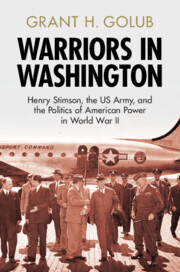Refine search
Actions for selected content:
10 results
4 - Defending the Gold Standard
-
- Book:
- The City's Defense
- Published online:
- 09 October 2025
- Print publication:
- 23 October 2025, pp 135-176
-
- Chapter
- Export citation

Warriors in Washington
- Henry Stimson, the US Army, and the Politics of American Power in World War II
-
- Published online:
- 23 June 2025
- Print publication:
- 10 July 2025
Introduction
-
- Book:
- Democracy, Theatre and Performance
- Published online:
- 17 May 2024
- Print publication:
- 27 June 2024, pp 1-18
-
- Chapter
-
- You have access
- HTML
- Export citation
Conclusion
-
- Book:
- Conflict, Diaspora, and Empire
- Published online:
- 15 June 2023
- Print publication:
- 29 June 2023, pp 273-283
-
- Chapter
- Export citation
Chapter 7 - Australia and coalition warfare in the Second World War
-
- Book:
- Strategy and Command
- Published online:
- 08 October 2021
- Print publication:
- 15 October 2021, pp 124-143
-
- Chapter
- Export citation
Chapter 8 - Deciding Australia’s war strategy in 1943
-
- Book:
- Strategy and Command
- Published online:
- 08 October 2021
- Print publication:
- 15 October 2021, pp 144-160
-
- Chapter
- Export citation
12 - International Protestantism and Its Changing Religious Freedoms
-
-
- Book:
- Christianity and International Law
- Published online:
- 17 May 2021
- Print publication:
- 20 May 2021, pp 246-262
-
- Chapter
- Export citation
5 - The Politics of Anti-Socialism in the Suburbs
- from Part II - Popular Conservatism and the National Government
-
- Book:
- Popular Conservatism and the Culture of National Government in Inter-War Britain
- Published online:
- 28 November 2020
- Print publication:
- 05 November 2020, pp 134-164
-
- Chapter
- Export citation
5 - “No ‘Rubber Stamp’ Ambassador”
-
- Book:
- Rogue Diplomats
- Published online:
- 24 April 2020
- Print publication:
- 21 May 2020, pp 239-301
-
- Chapter
- Export citation
2 - A History of Global Governance
- from Part I - Background
-
- Book:
- Global Governance and the Emergence of Global Institutions for the 21st Century
- Published online:
- 18 January 2020
- Print publication:
- 23 January 2020, pp 30-64
-
- Chapter
-
- You have access
- Open access
- HTML
- Export citation
